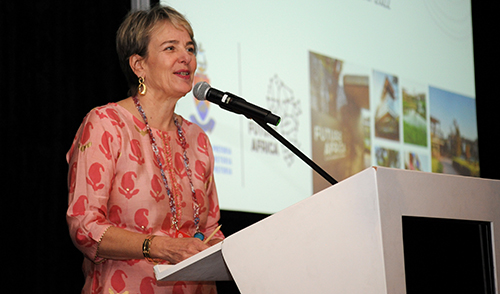Agreement Signed Between University Of Pretoria And International Science Council To Strengthen Presence Of African Science
The University of Pretoria’s (UP) Future Africa Institute and the International Science Council (ISC) have signed an agreement to support African agendas and capacities, and strengthen the presence of African science on the global stage.
The new agreement aims to reinforce an African voice for science and amplify this voice in international science, policy and funding debates and action.
“Future Africa looks forward to working closely with all African ISC members and fellows to understand the needs of scientists and scientific institutions on the African continent,” said Dr Heide Hackmann, Director of the Future Africa Institute and Strategic Advisor on Transdisciplinarity and Global Knowledge Networks at UP. “We plan to advance a robust consultative process that will inform how the ISC supports and engages with African science.”
Dr Heide Hackmann, Director of the Future Africa Institute and Strategic Advisor on Transdisciplinarity and Global Knowledge Networks at UP.
Dr Heide Hackmann, Director of the Future Africa Institute and Strategic Advisor on Transdisciplinarity and Global Knowledge Networks at UP.
Together with Future Africa, the ISC will engage in a co-design process for the voice for science in Africa, with African stakeholders specifically looking at key priority areas for strengthening science systems, identifying the long-term role of the council on the continent and supporting the process of establishing an ISC regional focal point.
“I would like to thank the ISC for being open-minded about developing new strategies on how best to cooperate with African partners,” said Professor Tawana Kupe, Vice-Chancellor and Principal of UP. “The University of Pretoria, with Future Africa in the lead, throws its full support behind this initiative; we are excited about the prospect of fostering closer connections between the ISC and the higher education network in Africa.”
The Future Africa Institute will lead the work on convening African partners in an inclusive scoping and development process on behalf of the council. This process will aim to articulate the needs of African scientists and science systems, make recommendations about the ISC’s future role and institutional presence in Africa, and identify pathways to implement those recommendations.
“The diversity of the science landscape in Africa calls for an inclusive consultation involving not only the active scientific community but also all relevant stakeholders – educators, industry and citizens as well as decision-makers – that will co-design the science agenda for Africa in the years to come,” said incoming ISC CEO Salvatore Aricò.
To achieve its ambitious goals and in the spirit of a widely consultative process with African stakeholders, the agreement relies heavily on the ISC’s African members and their representatives, ISC fellows from the continent, representatives of ISC partner organisations, and regional chapters of international programmes and networks that are co-sponsored or work under the auspices of the ISC.
The agreement enables both organisations to engage in a concrete and inclusive consultative process that uses their comparative strengths and advantages to maximise their impact on African science systems.
“We are confident that under the leadership of a pan-African organisation such as Future Africa, we can co-design a strong voice for African science through a future regional focal point,” said ISC President Peter Gluckman. “The dialogue has only just begun, and we look forward to developing this vision led by our members and Future Africa.”
Planned activities will also include a broader set of stakeholders and African scientists involved in science advisory mechanisms, combined with Future Africa’s pan-African and global networks, knowledge of African science systems, access to key decision-makers, and relevant capacities to support the scoping and development process.

